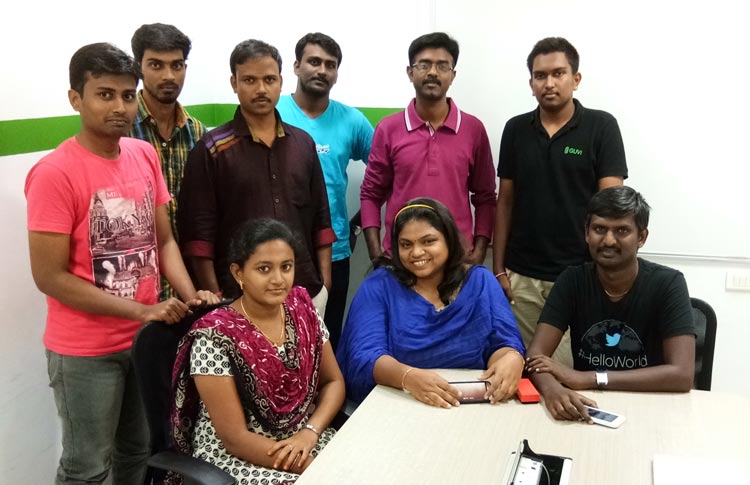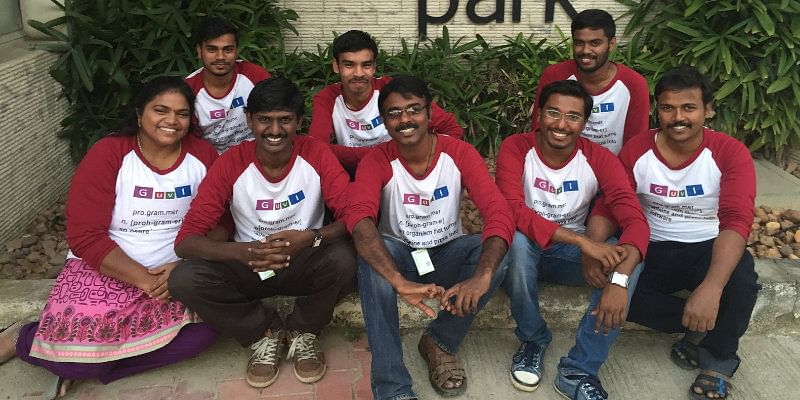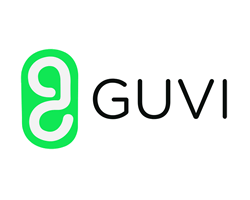On April 24th 2021, GUVI, a Chennai based education platform made some noise by breaking a Guinness World Record, in memory of Sri Devi, co-founder of the company, to honour her ideologies about educating the masses. Supported by AICity, GUVI conducted an AI for India program where 10 lakh Indians were upskilled online in 24 hours. Noticing a positive impact on 1 lakh people, the platform intends to extend the period of free access to this online workshop. Now a well known name in the education sector, the company has grown significantly since its humble beginnings.
When Arun Prakash, first graduate from his family, returned to his Alma Mater in the temple city of Madurai, after ten years for an alumni meet, he noticed a lot of changes. “The small plants had become trees, there were additional buildings, the number of buses had increased from 20 to 70, the number of students had increased, but one thing stayed the same. The students were still not exposed to the industry.“
He stood at a crossroad: he could either criticize the education system and return to his day job at PayPal or take the path less trodden and do something impactful. Choosing the latter, he shared videos from Harvard and MIT to some of his juniors at Madurai only to realise that they found it too lengthy and hard to understand. In an attempt to really connect with these students, he started a YouTube channel and uploaded shorter tutorials in ‘Tanglish’ (A combination of colloquial Tamil and standard English phrases.)
His expectations of only 6-12 views from the ‘knowledge thirsty’ students in a class of 60 were met with an eye-opening revelation. “We had 1 million hits within 4 months!” The insights showed viewer demographics from Singapore, UK and the US. “What’s shocking is, English is not a barrier for these students as they would have gone through TOFEL or other equivalent English exams to reach where they were,” Arun admits. “Learning technology is hard for first timers. Back at home we are used to group study sessions. So when all of a sudden you are pushed to a place where you have to learn alone, learn something tough and learn it in a non-native language – there are three barriers to the learning process.” His tutorials aimed to break two of these barriers and get to the point within 10 minutes or less.
Back at PayPal, a casual discussion with his colleagues from across India led to realisation that the problem was not only at a college in Madurai, but one deep in the underbelly of the engineering college ecosystem in India. As a result, in 2011, Arun roped in some of his colleagues and created GUVI (Expands to Grab Ur Vernacular Intent.)
GUVI did not settle with just solving this one problem. A larger one loomed amidst companies that wished to hire students from India. They look for diversity but eventually turn back to the IITs and NITs whose students they believe are easier to groom.
On June 19th, 2014, GUVI took a leap by applying to become an incubated company at IIT Madras Research Park. Sri Devi, Arun’s late wife and fellow PayPal Employee quit her job and became the first employee at the start-up. By November that year, registration as a Private Limited Company ensued. A few months later saw Arun Prakash and Bala Murugan quitting their 9 to 5 at PayPal. The founding team, now at their basecamp at the research park, prioritized creating the GUVI platform. “The videos were already on YouTube but having our own platform would let us understand how our users were learning and how we could improve their experience.”

Being incubated at the research park meant that IITMRP would have an equity stake over the company. Nevertheless the benefits trump it all. “We did not have to think about the infrastructure and logistics as much. We just focused on the business.” Association with a premier institution in India helped validate GUVI’s content as well. “It opened doors to opportunities like working with IIT Madras and onboarding professors. Some of the GUVI content is certified because of this,” adds Bala. “Someone in Madurai can now learn and get certified by IIT Madras at less than Rs.2000!” exclaims Arun emphasising on the scale of impact achieved through partnering with the renowned institute.
The positive response on Arun’s YouTube channel reinforced the idea of bootstrapping. Like most companies in their formative years, they felt that a B2B approach was the best way to start. “We formed a good rapport with companies. A built in coding platform would give a numerical value to every user whether they have the required technical background or not. This makes it easier for companies to recruit,” explains Arun.
Having been part of the hiring interview panel for more than 2000 students, Arun is the content head of the GUVI Platform. “The Registrar of Anna University invited us to be part of the Syllabus Forming Committee for Regulation 2017.” Though Python had successfully been integrated with the new syllabus, faculties were not equipped to train their students. To resolve this, GUVI ran a Python training program for about 983 people from Higher Education Institutes across Tamil Nadu.
The bootstrapping period saw growth. However, a funding of 1 million USD from Venture Capitalists, Gray Matters Capital and ECF, allowed GUVI to hire a solid team of 71 employees. The platform development and content team were hired using their own platform while an external team was brought in for sales and marketing. “When we started we did not think about raising funds. Now that we’ve learnt how to raise funds we have to learn how to raise bigger funds. As an entrepreneur you’re always part of that game.” says Arun with a chuckle.
With a larger team and more funds, content development scaled. “An average of 6 hours of content per video and a compilation of 100 course videos being made, about 600 to 1000 hours of course content exists,” calculate the duo. “Translation is the tough part. The videos are recorded at home most of the time. However, partner recording studios are available in different localities in India based on the vernacular language being recorded.” GUVI also works with exclusive content partners like UI Path on select courses.
Initial marketing relied on organising tech hackathons and contests leading to job opportunities (besides a cash prize.) “This brought a lot of people to our platform because they were able to learn and practice code in one place,” explains Bala. “With the new team in place, digital marketing on Facebook and Google for certain courses commenced. Weekly webinar sessions were also organised, where we invited employees from companies like AWS and Google, to inspire people to upskill themselves.”
The company managed to ride the wave of the epidemic by converting to a B2C model just on time, leading to a double in revenue – about 7 Crores. This business model saw the introduction of Zen Classes, a 3 month live intensive course in Full Stack Development. “We had to avoid creating another engineering college,” says a jovial Arun, ”So the 3 months are filled with projects which on completion would land you a job. Sometimes companies conditionally hire students and send them for the training program which on completion certifies them to be hired.”
Currently with 6 lakh users, 1000 partner colleges and 250+ product companies under their belt, Bala discusses the goals of the company. “This year we want to scale 4 times on revenue and 10 times on impact.” They have been extremely focused on educating people about technology since their early days on YouTube and do not see themselves branching out into other fields. “We want to make learning technology fun, whether you’re an arts student, a student from accounting or even a child!” With their eyes on the prize, the future of GUVI looks into expanding their demographic to children and native speakers of languages like Arabic, Malay and Spanish. There are plans on moving towards a subscription model as well.
Regarding the overall start-up experience, the duo claim that the VC ecosystem in Tamil Nadu isn’t great like Bangalore. “Working on a regulation for investors would be beneficial for a lot of start-ups that wish to set base here.” However, they agree that a base in Chennai has its merits. Besides the fact that hiring is much easier as there is great talent at an affordable cost, Tamil Nadu has a resourceful support system. “We had mentors like Harish Vembu and founders of mid level start-ups like Report Bee (now acquired by Xseed) and AhaGuru. Rural Technology and Business Incubator (RTBI) and Professor Ashok Junjunwala have also been supportive as they believe in upskilling initiatives that help rural areas through technology.”
The founders don’t back down easily. “We are used to our competitors degrading us because we use vernacular languages to teach. But that’s how we add value and break the barriers to learning. We are working towards becoming the best platform to learn Python.”







